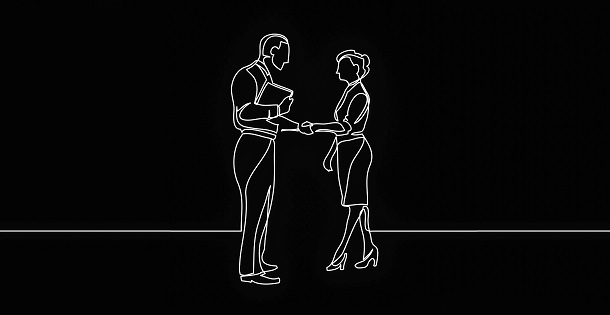You can sniff out a lie, right?
The deceiver always cracks under pressure or blathers nervously about unimportant details. They shift their eyes to the right.
In reality — although most people feel as though they can tell when they’re being lied to — our ability to determine truthfulness is probably not much better than chance.
Julia Minson teaches negotiation as an Assistant Professor of Public Policy at the Harvard Kennedy School. In one of her classes, Minson conducts an experiment in which four students report to the class on the happenings of their previous day. Two of the students, however, are instructed to fabricate their stories. After interrogating the volunteers, their peers vote on who is telling the truth. In a class of about 60, the students are unable to deliver accurate results. “These are Master’s-level students of policy,” Minson says, “Most people think they can tell a lie from a truth, and they really can’t.”
Even with minimal preparation, it’s fairly easy for most people to invent a believable falsehood. But there is help for the truth-seekers out there. Although you might not be able to discern if someone is telling you a bald-faced lie, you can shrewdly phrase your questions to extract the truth. Especially in stressful situations, the style of your query can determine whether you get an honest answer.
Minson led a series of recently-published studies on eliciting the truth in strategic negotiations — situations like interviews or purchasing a car. People tend to think of asking questions as an opportunity to gather information, but, in reality, the way you phrase questions reveals a lot about yourself. The answers you get could depend on what you’re projecting.
The studies focused on the veracity of responses when asked negative assumption questions (ones that assume a problem), positive assumption questions (ones that assume the absence of a problem), and general questions. Let’s say you’re interviewing a potential job candidate for your company. A negative assumption question would be, “How many times each day would you say you tweet during work hours?,” and the positive assumption alternative would be, “You don’t use social media during work, right?” The former type of questioning “increased disclosure of undesirable behavior” more often than positive assumption or general questions.
“When you ask questions that are more direct and assertive, it signals to the other person that you’re knowledgeable about an area and you’re not easily fooled,” Minson says. Since negotiations tend to make people anxious, many fall into the trap of asking softball questions when buying a used car or touring the umpteenth apartment in a long search for housing. A tendency for passivity can be escalated by inexperience, too. The bottom line is: if your ask is docile, people might be telling you what you want to hear instead of hard facts.
If the tactic makes you feel a little like Tom Cruise drilling Jack Nicholson in the courtroom in A Few Good Men, that’s because using assertive questions that assume problems is common in legal spheres. It’s all about cornering your “witness” with evidence and forcing them to take a stance. If you give people room to equivocate and eschew the truth, odds are that they will.
The next time you find yourself negotiating, ask the tough questions and bear awkward silences as long as is necessary to get the salesman (or contractor or hiring manager) to spill their guts.
The behavioral science of seeking the truth is a little more complicated between people with established relationships. Since friends and lovers have developed opinions of you over time, they’re less likely to read too much into your intelligence and experience from a single question. Minson says that it is still important to be mindful of how the questions you ask can reveal your opinions and knowledge, though. The way you bring up a new topic to your spouse or child can signal your position on the matter whether you intend to or not.
For impressionable adolescents, just asking questions can normalize behavior. That can be a good thing if you’re asking teens about exercise, but interrogating them unfoundedly about illegal drug use could backfire.
Given the new insight into cut-throat negotiating, does this mean we should all become hyper-aggressive schemers aiming to manipulate others in search of pure honesty? Probably not. A straightforward approach to strategic situations could help you gain an edge, though, as long as you can handle the truth.
Become a Saturday Evening Post member and enjoy unlimited access. Subscribe now



Comments
In sales it is fair to say buyers do tell a lot of untruths, often far more than sales reps do, which reminds to add sales representatives rarely utter outright lies – they simply withhold any adverse information or product drawbacks. My forte is being brutally honest with clients, to be forthcoming. confident and honest, you see I learnt long ago that if you adopt the sales attitude that no sale is worth lying for, this delivers a powerful message to buyers. Its not what I say, but my couldn’t careless attitude that counts. My secret is to ask myself “Do I want to sell to this guy?” if the answers No, I soon switch off, and they have to sell me on dealing with them. Lying is for sales amateurs, for fools and job-to -job-floaters. I can accurately guess within 30 seconds if someones going to buy or not, if I think their not- then watch how quick I walk out on them. Experience counts and brutal honesty pays big dividends.
This is good, insightful information. I like how you discuss truth and lies at work and dealing with people at businesses vs. those more personally and at home.
My work in marketing and dealing with clients often deals with my having to fix screw-ups I didn’t cause, because I’m good at it—-and spin control; so much so the client’s even happier than if it hadn’t happened—most of the time.
It usually requires a lie of deflection at first (almost always a ‘tech glitch’ even though it rarely is) legitimately fixing the problem, throwing in a distracting, unexpected extra bonus to re-frame the goof as a blessing to the client, charm, being “on”, liquor on occasion, and honest reassurance with laughter and a smile. That alone consciously helps keep my alpha male nature (not always a good thing) under control as needed, thank God.
Knowing when to be humble is one of life’s crucial lessons few learn, and also helps in getting other people more comfortable in telling the truth, especially if they feel they don’t have to have their guard up.